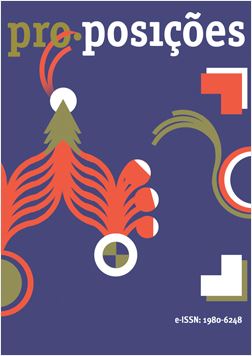Abstract
Considering, based on Vigotski’s reflections on the actor’s creative work, that character building can be a transformative experience in which the body and affections play a crucial role, we propose a scenic experience that transports such potentialities to social relations as a strategy for overcoming oppression at school. It is the Social Theater of Affections (TSA), the assumptions of which are based on Spinoza, Vigotski and Boal, especially on the concepts of intelligent emotion, catharsis, body, singular/universal dialectic and ethical-political suffering. As an example, we discuss a scenic intervention performed in municipal school aimed at confronting gender violence. The scenic actions place the actor as a dramatist and the audience as an actor, intertwining them in the feeling of the common and in the power to imagine and rehearse strategies to overcome oppressions crystallized in affections and social relations. Thus, in the creative act, individual suffering is transformed into collective action.
References
Boal, A. (2002). O arco-íris do desejo: método Boal de teatro e terapia (2a ed.). Civilização Brasileira.
Boal, A. (2005). Teatro do oprimido e outras poéticas políticas (7a ed.). Civilização Brasileira.
Brecht, B. (2005). Estudos sobre teatro Nova Fronteira.
Di Bertolli, K., & Garcia, D. (2021). Teatro social dos afetos na escola https://antigo.fundaj.gov.br/images/Ebook_TeatroSocialAfetos.pdf
Fernandes, K. C. (2014). Teatro do oprimido: uma prática em busca de transformação social [Dissertação de mestrado, Pontifícia Universidade Católica de São Paulo]. Repositório PUCSP. https://sapientia.pucsp.br/handle/handle/17078
Fernandes, K. C. (2019). Teatro social dos afetos [Tese de doutorado, Pontifícia Universidade Católica de São Paulo]. Repositório PUCSP. https://tede2.pucsp.br/handle/handle/22108
Ferreira, M. L. R. (2014). As metamorfoses da alegria [Artigo apresentado]. X Colóquio Internacional Spinoza, Rio de Janeiro/Fortaleza, Brasil.
Freire, P. (2005), Pedagogia do oprimido (49a reimp). Paz e Terra
Patto, M. H. S. (2015). A produção do fracasso escolar: histórias de submissão e rebeldia (4a ed. ver. amp.). Intermeios.
Piacentini, N. (2018). O ator dialético [Tese de Doutorado, Universidade de São Paulo]. Biblioteca Digital de Teses e Dissertações da USP. https://doi.org/10.11606/T.27.2018.tde-03102018-154628
Saffioti, H. I. (1989). A síndrome do pequeno poder. In M. A. Azevedo, & V. N. A. Guerra (Orgs.), Crianças vitimizadas: a síndrome do pequeno poder Iglu.
Santos, B. (2016). Teatro do oprimido: raízes e asas – uma teoria da práxis Ibis Libris.
Sawaia, B. B. (1999). Artimanhas da exclusão: uma análise ético-psicossocial da desigualdade Vozes.
Sawaia, B. B., Magiolino, L. L. S., & Silva, D. N. H. (2020). Imagination and emotion as the basis of social transformation. In A Tanzi Neto, F. Liberali, & M. Dafermos (Orgs.), Revisiting Vygotsky for social change (pp. 241-261). Springer.
Spinoza, B. (1977) Tratado político (M. Castro, trad., 2a ed.). Estampa. (Obra original publicada em 1677)
Spinoza, B. (2013). Ética (T. Tadeu, trad., 3a ed.). Autêntica. (Obra original publicada em 1677
Spinoza, B. (2019). Spinoza, Obra Completa III: Tratado Teológico-Político (J. Guinsburg, N. Cunha, & R. Romano, trad.). Perspectiva. (Obra original publicada em 1670
Vigotsky, L. S. (1990). Obras escogidas, tomo I (J. M. Bravo, trad.). Visor. (Obra original publicada em 1982)
Vigotski, L. S. (1999). Psicologia da arte (P. Bezerra, trad.). Martins Fontes. (Obra original publicada em 1965)
Vigotski, L. S. (2010). Psicologia pedagógica (P. Bezerra, trad., 3a ed.). Martins Fontes. (Obra original publicada em 1926
Vigotski, L. S. (2023). Sobre a questão da psicologia da criação pelo ator. (P.N. Marques, Trad.). Pro-Posições, 34, ed0020210085. http://dx.doi.org/10.1590/1980-6248-2021-0085 (Obra original publicada em 1936).
Boal, A. (2006). Jogos para atores e não atores (9a ed.). Civilização Brasileira.
Boal, A. (2009). A estética do oprimido Garamond.
Ferreira, M. L. R. (2014). As metamorfoses da alegria. In B. N. A. Grasset, E. A. R. Fragoso, E. M. Itokazu, F. Guimaraens, & M. Rocha (Orgs.). Spinoza e as Américas (pp. 265-276). EdUECE.
Sawaia, B. B. (2009). Psicologia e desigualdade social: uma reflexão sobre liberdade e transformação social. Psicologia & Sociedade, 21(3), 364-372. https://doi.org/10.1590/S0102-71822009000300010
Scott, J. (1995). Gênero: uma categoria útil de análise histórica (G. L. Louro, trad.). Educação & Realidade, 20(2), 71-99. (Obra original publicada em 1988)
Stanislavsky, C. (1990). A criação de um papel (F. P. P. Lima, trad.). Civilização Brasileira.
Vigotski, L. S. (2009). Imaginação e criação na infância. (A. L. Smolka apresent. introd.; Z. Prestes, trad.). Ática. (Obra original publicada em 1930)
Vigotsky, L. S. (2004) Teoría de las emociones: estudio histórico-psicológico (J. Viaplana, trad.). Alkal. (Obra original publicada em 1984)

This work is licensed under a Creative Commons Attribution-NonCommercial 4.0 International License.
Copyright (c) 2023 Pro-Posições


